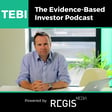Become a Creator today!Start creating today - Share your story with the world!
Start for free
00:00:00
00:00:01

Ep 7: See you in court
As regular TEBI readers know, the academic evidence overwhelmingly shows that most investors are better off investing in low-cost index funds.
But most financial advisers still recommend actively managed funds instead. As a result, investors are ending up with pension pots considerably smaller than they should be.
So, is there a case for suing advisers who carry on investing their clients’ money in expensive funds that fail to deliver? Phil Miller certainly thinks so. A former adviser himself, Phil’s company Pension Focus represents clients who feel they’ve been badly advised.
Transcript
Introduction to Tebbi podcast and sponsorship
00:00:05
Speaker
Hello and welcome to the first Tebbi podcast of 2017, brought to you by Regis Media. I'm Robin Powell.
Critique of actively managed mutual funds
00:00:14
Speaker
Now, anyone who's seen my blog, The Evidence-Based Investor, will know that I'm not a big fan of actively managed mutual funds.
00:00:22
Speaker
In principle, active management sounds fair enough, but in practice, only a tiny number of funds outperform over the long term and they're almost impossible to spot in advance. Consequently, most investors in active funds end up worse off than if they'd simply invested in low-cost index funds.
Why do advisors recommend active funds?
00:00:43
Speaker
The problem is that most financial advisors in the UK still recommend active funds.
00:00:49
Speaker
So, given all the evidence that most investors shouldn't be using them, will we start seeing investors suing their advisors for compensation? Joining me via Skype is Phil Miller from a firm called PensionFocus, which represents clients who feel they've been badly advised.
Phil Miller's history and advocacy transition
00:01:09
Speaker
Phil, perhaps you could start by briefly explaining your own background and how this all started.
00:01:15
Speaker
Well, I saw it from the inside, Robin. I was a financial advisor way back in 2001 to 2003. And then from there, I got into complaint handling. Now, back in those days, the big issue was the misselling of mortgage endowment policies. These were complex products with very high costs. And while the markets were booming in the 80s and 90s, they did what they were supposed to do.
00:01:44
Speaker
and allowed people to pay off their mortgages. And then when the market crashed from 2000 to 2002, 2003, all of a sudden people were realizing that they didn't have anywhere near enough money to pay off their mortgage. And ultimately billions of pounds, I would say, somewhere approaching 10 billion in 2016 money will have been paid out in compensation on that issue.
00:02:09
Speaker
Like me, you're a strong advocate of indexing. How did that come about? Again, when I was an advisor way back in 2001 and 2002, we were trained, I worked for a big bank and we sold index funds as well as other financial products and we were told way back then that index funds would deliver better performance than the majority of the actively managed counterparts and that was mainly due to their lower costs. So I was aware of it back then but
00:02:39
Speaker
I guess it really sank in for me. Maybe towards the end of the decade, so 2009, 10, we'd seen a huge stock market crash, obviously, after the financial crisis. And I think there was increased focus on the damage that all of these excessive costs had done. And that damage becomes more apparent when the markets fall. And so it reminds me of a Warren Buffett saying, we see who's been swimming naked when the tide goes out.
00:03:08
Speaker
So that's when you hear people like Warren Buffett and Jack Bogle and Charles Schwab advocating index funds, it's almost the the nail in the coffin for me for actively managed funds because these guys are obviously enormously knowledgeable and able and it's not any Joe Soap saying it.
Transparency in asset management fees
00:03:29
Speaker
Something else we have in common Phil is that we're both on the transparency task force which for those who haven't heard of it is a UK based organisation that's campaigning for greater transparency in asset management particularly around fees and charges. But for you Phil, transparency on its own is not enough is it? Explain that. Yeah, let's assume we had perfect transparency from today onwards and financial advisors started
00:03:58
Speaker
you know, selecting low-cost index funds a lot more and doing whatever they could to reduce their clients' investment costs. First of all, I don't think that's going to happen, but secondly, even if it did, that wouldn't help people who've been paying excessive costs for years and years and decades in some cases. In my work, I've come across a lot of people who are retired and are living off incomes that are maybe a third of what they ought to have had.
00:04:29
Speaker
These are real people and these are real lives and it's such a shame and of course transparency from now on doesn't help those people.
Legal action against unsuitable financial advice
00:04:39
Speaker
So your plan now is to start taking action on behalf of investors who feel that the advice they've been given was unsuitable. How strong a case do you think clients will have? Unsuitable advice is the regulator and the financial ombudsman service would call it comes in many guises but
00:04:59
Speaker
but most of the time there are common themes and those themes are excessive and unjustifiable costs and excess risk. And as we all know, up until 2013, the vast majority of financial advisors in the UK were remunerated by commission. Commissions were banned in 2013 by the regulator, but the high
00:05:28
Speaker
the high cost products naturally paid the highest commissions. And so that's what a lot of financial advice businesses recommended for the clients, the high cost products. And so where there's a low cost alternative, an obvious one, then really the advice business doesn't have a leg to stand on. And as we've said, and as we know all too well,
00:05:56
Speaker
those excessive costs, which could be seemingly small, you know, year on year, compounded over many years and decades, they can do enormous damage. We haven't seen cases like this in the UK before, but there have been some big payouts in the US to investors who've paid excessive fees, haven't there? Well, there's a bit of a distinction because in the US, there have been a lot of high profile legal actions against
00:06:25
Speaker
huge company pension schemes. And they've been, I think in the last couple of years, in each of the last two years, there's been over a billion dollars in settlements. There's also been a very high profile case that went to the Supreme Court and resulted in a nine to zero judgment. Now, nine to zero judgments are very rare in any area of the law. And this was actually the first pension scheme, excessive fee case to go before the Supreme Court.
00:06:55
Speaker
So that 9-0 victory is very significant. But that's in the company pension scheme space. In the US, most of the actively managed funds sold in the last 20, 30 years have been sold by brokers rather than fiduciary advisors. Now, those brokers operate under far lower standards. What a lot of people don't know is that here in the UK, since April 1988,
00:07:20
Speaker
financial advisors have operated under a fiduciary standard. So they've been required to act in their client's best interests and sales of high cost investment products, quite an obvious breach of that duty of care that advisors have had here. What we also have in the UK, which doesn't exist in the US, we have a financial ombudsman service here, which is first of all, free to the complainant and second of all,
00:07:48
Speaker
doesn't have the long stop time limit that the civil courts have. So the Financial Ombudsman Service can and does uphold complaints about advice given in the 80s and the 90s and it can make a legally binding compensation award of up to £150,000. Potentially Phil, how big a scandal do you think this might turn out to be? I think it's enormous Robin. We talked about mortgage endowments before, in 2016 pounds that might be somewhere approaching
00:08:18
Speaker
10 billion. The biggest one in financial terms so far has been the PPI misselling scandal and I think the banks alone have set aside more than 30 billion pounds for that one. Pensions and investments, excessive fees, potentially it's a quarter of a billion pounds. It could be even more than that. The whole UK equity and bond markets are worth about 7 trillion off the top of my head.
00:08:48
Speaker
even 700 billion would only be 10% of that and even that's not out of the question. These are vast sums of money we're talking about.
Impact of legal actions on the financial sector
00:08:59
Speaker
Is there a danger that if this snowballs legal redress could actually destabilise the whole financial sector? No, I don't think that's the case. Few good reasons why. First of all the courts tend to look at the facts and the evidence of individual cases rather than implications for
00:09:18
Speaker
entire industries. A good parallel is asbestos. Over $100 billion has been paid out in compensation on that issue over the last 50 or 60 years. It nearly actually brought down Lloyd's of London. It actually was Berkshire Hathaway, Warren Buffett's company that stepped in and effectively rescued Lloyd's of London there. But the cause didn't look at the implications for industries over the next few decades to decide
00:09:47
Speaker
what was the right thing to do. They looked at the facts and the evidence on the individual cases. Another point to consider on this as well is that investment management doesn't add to national productivity. It doesn't add to GDP. So active managers are involved in rearranging who owns all the portions of the pie. Then they don't make the pie bigger. So it would actually be good for the country from almost any point of view if more people
00:10:15
Speaker
were engaged in productive endeavors unless we're rearranging the rest of the productive people's ownership of assets. More from Phil Miller from pension focused in a moment, but first a message from our sponsor. For investors, there's never been greater access to information and the financial media is as distracting as ever. Regis Media helps advisors produce great content, whether that's video, podcasts, graphics, animation, or written articles.
00:10:44
Speaker
It's about educating your clients and being transparent about how you put their money to work. Let's help investors tune out the noise and focus on what's really important. Regis Media, connecting advisors with clients.
00:10:56
Speaker
Phil Miller, I feel as strongly as you do that advisors shouldn't be recommending actively managed funds.
Advisors' responsibilities and investment advice
00:11:03
Speaker
Only they can tell us why they continue to do so. But in my own experience, most advisors mean well. They want to do the right thing. As a former advisor yourself, how comfortable do you feel about taking advisors to court? To be honest, there is a part of me that feels uncomfortable about it, although I felt I used to feel more uncomfortable about it
00:11:25
Speaker
than I do now having seen and met with and seen the plights of so many people who are living on their state pension plus five grand a year when they should be living on their state pension plus 15 grand a year. Now that's an enormous effect on somebody's standard of living in retirement after decades of working hard and saving. And ultimately, financial advice businesses are required to act in the client's best interest
00:11:53
Speaker
and they have professional indemnity insurance to pay compensation when they don't. So overall, I think, you know, to put any bad situation right, somebody's gonna feel a negative effect from it, but I think the positives far outweigh the negatives.
FCA's report on actively managed funds
00:12:12
Speaker
And presumably, you feel emboldened by the Financial Conduct Authority's interim report on its study into competition in UK asset management. That report was highly critical, of course, of actively managed funds and raised concerns that more advisers aren't recommending cheaper, passive alternatives. Absolutely, yeah, because I think it's the first time that a regulator has publicly acknowledged this huge problem. These basis points, these hundreds
00:12:42
Speaker
of a percent or tenths of a percent or even whole percentage points. Again, they may not seem like much on the surface, but they equate to billions of pounds being diverted from where it should be to where it shouldn't be. And ultimately, if this problem isn't fixed, it will just compound and compound and compound. And I think Charlie Munger said an ounce of prevention is worth a pound of cure.
00:13:11
Speaker
And so to deal with it now, while it might be painful for some, that's nowhere near as painful as it's going to be if it's not dealt with now.
Guidance for claimants and advisors
00:13:19
Speaker
Finally, Phil, what would your message be? First to people who think they may have a case against their advisor, and secondly, to advisors who continue to invest their clients' money in active funds. To anybody who thinks they may be entitled to compensation,
00:13:37
Speaker
All I can say is there's nothing to lose. There's everything to gain. Pension focus operates on a no-win, no-fee basis. So we do the work if we think somebody has a valid claim. If they get compensation, they don't pay the fee until after they've received it. If they don't get compensation, they don't pay a penny. To financial advisors who continue to expose their clients to these unjustified and excessive costs, I would say
00:14:06
Speaker
First of all, they really need to look at and understand the evidence and the effects of these costs. And they need to think about how that translates into foregone holidays or meals in restaurants for people who are retired and should be enjoying life. And finally, they need to think about the sustainability of their own business because a couple of upheld complaints and compensation claims can first of all vastly increase their
00:14:36
Speaker
professional indemnity insurance premiums and could even lead to them not being able to get cover at all. And if they can't get cover, they can't do business. So if financial advisors really want a sustainable business and be able to do the right thing for the clients in the long term, they really need to be thinking about eliminating any excessive and unjustifiable costs.
Closing remarks and sponsorship
00:15:01
Speaker
Phil Miller from Pension Focus. Thank you for joining us. We shall be watching this situation with great interest. Thank you as well to you for listening to this podcast, which is produced and sponsored by Regis Media. Find out more at RegisMedia.com. Until next time, goodbye.
















